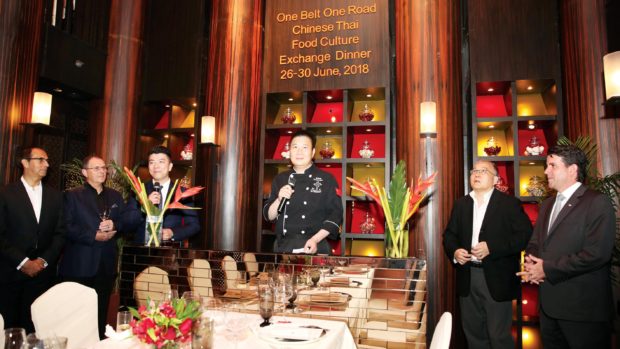
Chef Mai Guangfan, third from right, from South China’s Guangdong province, displayed his culinary skills at the cultural exchange activity under the theme, One Belt One Road, Chinese Meets Thai Food, in Bangkok last month. PHOTO PROVIDED TO CHINA DAILY ASIA WEEKLY
BANGKOK — State-owned and private companies from China are expanding their business in culture, tourism, and aging related industries along the Belt and Road area.
In June, a cultural exchange activity under the theme One Belt One Road, Chinese Meets Thai Food was organized by Hong Kong-based Group Talent Global Ltd (GTGL).
At the event, chef Mai Guangfan from South China’s Guangdong province presented his signature creation, dry abalone with prawns caught from the Mekong River, and other Chinese and Thai dishes.
Michael Chin, executive chairman of GTGL, said the hospitality investment firm is working with business partners, including Chinese State-owned enterprises, to acquire large-scale land parcels in Bangkok for integrated mixed-use development. The project will franchise international hotel brands to support a health and wellness club.
Aging related business is also gaining a foothold in the region and spurring growth. As well as assisting the tourism industry, international hotels are key to assisting aging related businesses, said Chin.
“Two kinds of businesses will be sure to win in the world — travel and aging related businesses. Global aging trends continue to spur growth for aging related businesses, apart from the hotel industry. International hotels are not only just assisting the country’s tourism sector but also the major key to helping aging related businesses,” he noted.
Greg Liddell, right, general manager of the Mandarin Oriental, Bangkok — one of the oldest and most prestigious hotels in Thailand, and Michael Chin, left, executive chairman of Group Talent Global Ltd, jointly present a cultural exchange activity under the theme One Belt One Road, Chinese Meets Thai Food. PHOTO PROVIDED TO CHINA DAILY ASIA WEEKLY
In addition, he said a Belt and Road Hospitality Fund will be established, which has already secured some well-known catering groups and travel agencies.
The fund aims to invest in Bangkok hotels and introduce Chinese food specialties, health maintenance and art, Chin said.
Wang Youping, managing director of China Railway Engineering Corporation (CREC), said the culture and tourism industry has become a major aspect for the company.
“We used to focus on infrastructure construction, but now we have started to develop industrial chain investment and one new direction is tourism projects,” he noted.
Wang told China Daily Asia Weekly that CREC is searching for tourism related projects in Thailand and plans to establish an international school in Malaysia.
Besides larger corporations, more and more Chinese individuals are investing in Thai property to spend holidays in or to rent out to tourists.
James Duan, CEO of Bangkok-based developer Fragrant Property, has opened several service property projects in Thailand and many are Chinese buyers.
“In the past, Chinese bought property in Europe and America, attracted by their education resources, but since 2016 Chinese buyers in Thailand surged distinctly for relaxation and entertainment resources,” he said.
Duan said he plans to focus on hotel operations next year, “because the tourism industry is developing so well”.
For Chinese travelers, countries and regions along the Belt and Road have become increasingly popular tourism destinations, especially countries involved in the Lancang-Mekong Cooperation, an important platform for advancing the Belt and Road Initiative.
Last year an estimated 15 million Chinese visited Cambodia, Myanmar, Thailand, Vietnam and Laos, according to Ctrip, one of China’s largest online travel agencies.
Thailand received the majority of them, as one-fifth of all Chinese outbound travelers visited the country in 2017, Ctrip’s data showed. Vietnam welcomed more than 4 million Chinese in 2017, up 48.6 percent compared to the previous year, and this group is also the largest among the nation’s foreign travelers.
According to People’s Daily Online, 150 million Chinese tourists are expected to generate US$200 billion worth of consumption in countries and regions along the Belt and Road between 2016 and 2020.
Behind the surging numbers, however, Chinese visitors’ traveling patterns are changing, and investment in Belt and Road countries is upgrading accordingly.
Greg Liddell, general manager of the Mandarin Oriental, Bangkok — one of the oldest and most prestigious hotels in Thailand — noticed that Chinese tourists are expanding their interests from shopping to hotel experiences, in areas like food and beverages, wellness activities and spa treatment.
Food is among the 10 key industries in Thailand’s Eastern Economic Corridor open to Chinese investment, said Thailand’s Deputy Prime Minister Somkid Jatusripitak. He was speaking at the third Belt and Road Summit in Hong Kong on June 28.
Countries in the region have universally acknowledged that the role of gastronomy is essential to building a competitive destination brand.
At the 21st Meeting of Asean Tourism Ministers held in Chiang Mai, Thailand, in January, the Joint Declaration on Gastronomy Tourism was signed. It aims to establish a gastronomy platform for knowledge sharing to substantially expand gastronomic experiences in the Association of Southeast Asian Nations.
As Chinese travelers explore more in-depth tourism, investors are also exploring new projects.
Liddell said the Mandarin Oriental, Bangkok is working fast to introduce e-payment links to China’s technology companies, to better serve tech-savvy Chinese guests.